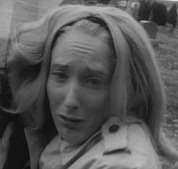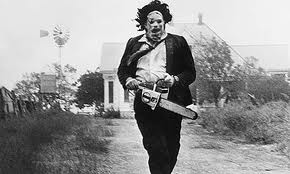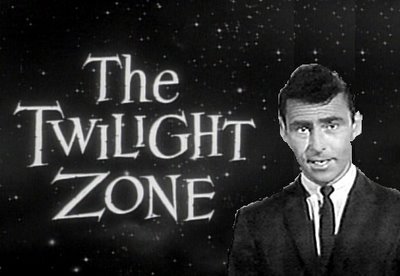By Melissa Antoinette Garza
“You fools! You kill me, you’ll die.” – Adam Grant (Dennis Weaver)
This fantastically memorable episode opens with Adam Grant (Dennis Weaver) being found guilty of murder in the first degree and sentenced to death. He begins to rant and rave swearing that all which is happening is a reoccurring dream and that if he is put to death, that everyone within the courtroom would surely die as well. After all, the world itself isn’t real.
Most believe that he has just gone mad or fears death and is lying. His ability to perfectly describe an execution in details so specific one would have had to be present to know, impresses and horrifies the inmates.
Adam’s defense attorney Paul (Wright King) starts to believe his defendant. In a panic, he makes a late night visit to district attorney, Henry (Harry Townes) and begs him to stop the execution. Henry begrudgingly agrees to go to the cell and speak with Adam. Initially, Henry just thinks he’s insane but the more Adam talks the more it makes sense to Henry though outwardly he acts as though he doesn’t believe a word.
As the clock grows closer to midnight, Henry argues with himself trying to determine whether or not to spare Adam’s life.
This episode is one of my favorites. The philosophical quandary of what is really real, and how do you know you are real is a fascinating one that always makes an interesting topic for contemplation. When the brilliance of Rod Serling brings forth these questions, something magical occurs.
So often nowadays, producers, directors, writers and actors confuse intelligent productions with pretentious filmmaking. The two are far from the same. The most important element to a movie or a novel is that a powerful story is told. When a great story is told and human nature is a primary focus, the production itself is bound to be intelligent. Rod Serling understood this. Though he is responsible for the most groundbreaking, clever and ingenious TV show that ever graced screens, he never fell into the level of pretentiousness. There was never a superiority complex that radiated from the show. It was very basic yet possessed the grand understanding of the human mind which allowed everyone who viewed the show to relate to it.
Sadly, this wonderful style has all but disappeared. Now, there are two types of productions. One which has no intellectual element and appeals to lowest common denominator. Shows like Jersey Shore or movies like Grown Ups come to mind. On the flipside, there are shows and movies that try too hard to be clever that not only do they forget to tell a story, but are so focused on being of a higher class than other productions that it becomes impossible to relate to. The gothic horror production “Let the Right One In,” or TV shows like the “Big Bang Theory” are prime examples. It’s interesting to know that “The Big Bang Theory” uses actual science and physics to solve the quandaries from the show. That fact is interesting, the TV show is not. It’s lame in the sense where it attempts to talk down to its audience at the same time trying to excuse the behavior in the traditional hipster douchebag method of making fun of itself. Just tell a story.
lowest common denominator. Shows like Jersey Shore or movies like Grown Ups come to mind. On the flipside, there are shows and movies that try too hard to be clever that not only do they forget to tell a story, but are so focused on being of a higher class than other productions that it becomes impossible to relate to. The gothic horror production “Let the Right One In,” or TV shows like the “Big Bang Theory” are prime examples. It’s interesting to know that “The Big Bang Theory” uses actual science and physics to solve the quandaries from the show. That fact is interesting, the TV show is not. It’s lame in the sense where it attempts to talk down to its audience at the same time trying to excuse the behavior in the traditional hipster douchebag method of making fun of itself. Just tell a story.
Nowadays, horror productions are faced with the same nonsense. On one end, there are the thoughtless pieces of trash like the Saw series which once again appeal to the lowest common denominator. People who are intent watching torture flicks with zero character development find these movies enjoyable.
On the other, there are movies which could potentially have promise but instead travel the road of ostentatious nonsense. Many times it appears that the filmmakers want to distance the production away from the genre so they try to incorporate a deeper message.
 Don’t get me wrong. There isn’t anything wrong about a genuinely deep film which examines elements of humanity and provides commentary on what the filmmakers view as the ills of society. When done correctly, the results can be profound and memorable. In the horror genre, movies like the original “Night of the Living Dead,” “Psycho,” “The Shining,” “Timecrimes,” and “Dead End” come to mind. For low and micro-budget productions, the 1991 version of “Kingdom of the Vampire” and Don Dohler’s “Blood Massacre” and “The Screaming” are all great films and excellent examples of intelligent horror productions. All of which tell a great story and examine human nature in an intellectual and philosophical manner without talking down to the audience or offering an affected wannabe art production.
Don’t get me wrong. There isn’t anything wrong about a genuinely deep film which examines elements of humanity and provides commentary on what the filmmakers view as the ills of society. When done correctly, the results can be profound and memorable. In the horror genre, movies like the original “Night of the Living Dead,” “Psycho,” “The Shining,” “Timecrimes,” and “Dead End” come to mind. For low and micro-budget productions, the 1991 version of “Kingdom of the Vampire” and Don Dohler’s “Blood Massacre” and “The Screaming” are all great films and excellent examples of intelligent horror productions. All of which tell a great story and examine human nature in an intellectual and philosophical manner without talking down to the audience or offering an affected wannabe art production.
Sadly, there are more examples of those wanting desperately to separate themselves from the horror genre. One perfect example of this is “The Final,” which rather than telling the story of bullied youth who seek retaliation attempted to oversell their motive and cause for sympathy so much so that rather than smart it came across hokey, unrealistic, and worst of all – insulting.
A great movie doesn’t need the lead explaining why they did what they did. The entire production before the conclusion should do this. Psycho is a perfect example. Norman Bates didn’t have to sit down and explain why he murdered or how he lost his mind. Dialogue like “a boy’s best friend is his mother” and “we all go a little mad sometimes” tells the audience the mindset of Norman. It allows the viewers to delve into the mind which packs such a stronger punch than a narration from the lead. It’s such a better method than the now typical ranting of a lunatic with philosophical quotes and names thrown in.
Recently, I began to watch a micro-budget movie “Blood Creek” (2006) which began with a bunch of college-age kids having a pool party. One spooky old woman who they believe to be a cranky neighbor comes by. After she leaves, one of the kids throws in a comment about the German philosopher Friedrich Nietzsche. It wasn’t plot or dialogue driven. Though the writer forced it to make sense in context, it is a conversation that would never realistically take place. It instantly lost the film credibility. Both the initial comment and then several other actions throughout were so out-of-place that it seemed as though the filmmakers wanted to make it clear that they were intellectuals. Had the film been comfortable in its own skin and content being a story-driven horror movie, it could have succeeded nicely. The premise wasn’t half bad. It was the execution which they failed in and that was sadly solely due to the hipster style pretentiousness of the production.
So many times, whether it is mainstream, independent productions, foreign pictures, or even micro-budget – one will see the dissatisfaction with the horror genre in its very own productions. It is often treated like the bastard child of the film industry. In many ways this stigma, was popularized by film critics Siskel and Ebert in the 80s when they were opposed to nearly every scary movie released. Horror was not only an unappreciated and unrecognized art but one that was often insulted and looked down upon as void of any intellectual merit.
horror genre in its very own productions. It is often treated like the bastard child of the film industry. In many ways this stigma, was popularized by film critics Siskel and Ebert in the 80s when they were opposed to nearly every scary movie released. Horror was not only an unappreciated and unrecognized art but one that was often insulted and looked down upon as void of any intellectual merit.
This was untrue in the 80s and it is untrue now. This may be one reason why so many horror films betray themselves by incorporating elements that do not belong in their film. Whether it’s throwing the name of a philosopher into dialogue, utilizing black-and-white shots with the hope of looking like art, or trying to overly represent the darkest side of human nature in overrated movies like American Psycho (2000)-horror films are forgetting to tell stories. They are forgetting to delve into the average person’s human nature which is far more horrifying than one who is either superhuman or void of emotion. When the audience can relate to what they are seeing they are more inclined to fear. It is the twinning or seeing oneself in a character under serious duress which makes horror such a uniquely special and (YES) intellectual genre. One being able to relate to the lone survivor in Texas Chainsaw Massacre (1974) is an experience like no other. It is the level of understanding the reaction that the viewers have seen which makes the movie’s conclusion such an intense one.
Rod Serling utilized this same strategy episode after episode – though generally and purposefully obtaining different results. To understand the reactions of the characters in episodes like “Monsters are Due on Maple Street” or “Shelter” creates not only a self-awareness which is difficult to swallow at times, but also openly displays the flaws that we as a society spend so much time attempting to hide. Whether it was prejudices, selfishness, anger, or rigidness – the ability to see in such an honest fashion, our own inclinations on display is not only fascinating and the work of an amazing storyteller, but also that of a genius. Rod Serling produced intelligent and captivating work – never once speaking down to the audience or trying to elevate himself or his own work above that of the viewers. He was above that and episodes like “Shadow Play” only reinforce his level of brilliance.
Scared Stiff Rating: 9/10
